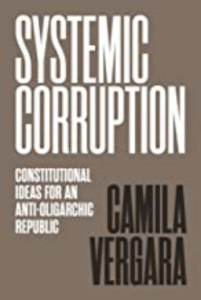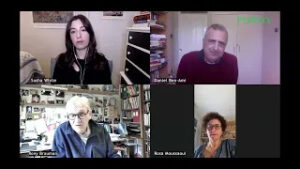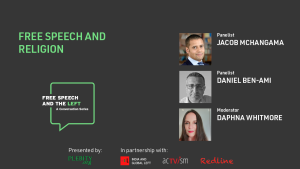How the Left Has Lost Its Way
 If anyone is wondering just how deep is the left’s abandonment of its most long-standing and foundational values, namely free speech and class analysis, one need look no further than this book about populism: Systemic Corruption: Constitutional Ideas for an Anti-Oligarchic Republic by Columbia Law School postdoc scholar Camila Vergara.
If anyone is wondering just how deep is the left’s abandonment of its most long-standing and foundational values, namely free speech and class analysis, one need look no further than this book about populism: Systemic Corruption: Constitutional Ideas for an Anti-Oligarchic Republic by Columbia Law School postdoc scholar Camila Vergara.
Vergara leads us through a rich thought experiment on how a world could be structured free from domination of the many by the few. She lays out in detail the thoughts of a range of important political philosophers about concrete ways to define a truly populist, plebeian form of governance.
Vergara describes her goal in writing this book:
“This is a book written against the grain that recovers a lost plebeian tradition and seeks to radically transform constitutional democracy to empower common people against the powerful few who today control most of the financial resources and keep political elites on their payrolls.”
The book unravels a long history of plebeian strands of thought, starting with Plato, Cicero, the Roman Republic, Machiavelli, Nicolas de Condorcet (of the French revolution), Rosa Luxemburg, Hanna Arendt, and ends with Vergara’s own take on what a plebeian solution could look like, including her own proposed plebeian constitution.
Her most general point throughout the book is that corruption must be thought of as a systemic problem rather than simple malfeasance of individuals caught breaking the rules. The real corruption of the oligarchy, which allows them essentially unchecked power, is because of, not in spite of the laws.
Along the way she pulls together some fascinating details. We learn the story of a largely forgotten populist revolt, Shay’s Rebellion of 1787, which mirrors certain aspects of the populist farmers revolt of the 1880s in the Southern U.S. which I wrote about here.
This story, like the later one, also begins with indebted farmers, this time in post revolutionary New England, specifically Western Massachusetts.
An anonymous writer said at the time:
“I have been greatly abused, have been obliged to do more than my part in the war, been loaded with class rates, town rates, province rates, Continental rates, and all rates … been pulled and hauled by sheriffs, constables, and collectors, and had my cattle sold for less than they were worth … The great men are going to get all we have and I think it is time for us to rise and put a stop to it, and have no more courts, nor sheriffs, nor collectors nor lawyers“ (Anonymous, 1786).
Like the Southern farmers of the 1880s, Vergara tells us how it began:
“As early as 1784, citizens affected by debt, taxes and lack of currency began to spontaneously organize in committees or councils…” (pp80)
Farmers, in debt, were losing their land and being put in jail. Unlike the Texas farmers of the 1880s this turned into an armed revolt. The farmers gathered, surrounded courthouses where the records of their assets (land ownership) and debts were held, and tried to burn them down in an attempt to prevent the debt records being used to take away their land.
As Vergara comments: “…the debt rebellion was not the work of a bunch of corrupt men or a deceived multitude, but a plebeian movement based on local committees organized for exercising their constitutional rights.”
Leaving behind this historical example of a populist uprising, Vergara moves on to consider various strands of plebeian thought, brilliantly illustrating the vision of each of her political philosophers with simple graphics that give an easy way to visualize their views.
Consistent on some points, the thinkers chosen by Vergara conceptualize various forms of plebeian councils that work in tandem with the elites, although for Luxemburg this arrangement is considered a transition on the way to a socialist society. For her, action comes first, and the plebes will learn how to make it work as they gain the actual experience of governing and politics.
Another common thread, explicitly stated by the French revolutionary Condorcet, Rosa Luxembourg, and Hannah Arendt is the centrality of free speech and rights of assembly.
On Hannah Arendt and free speech: “She [Arendt} argues that what made Luxemburg a real outsider within the revolutionary Left was her staunch commitment to the republic and its guarantee of democratic rights such as free speech and assembly” (pp184-185)
On Rosa Luxemburg and free speech: “Neither the French Revolution nor Lenin’s Soviet Republic respected free speech and assembly, or fostered autonomous organs of the people, and therefore both failed at constituting appropriate foundations for freedom” (pp196).
And also from Luxemburg: “There are “two basic elements the revolutionary constitution must have in order to enable the path to socialism: Democratic rights to free speech, assembly, and suffrage to assure the conquest of representative structures…”
Finally, we arrive at the concluding section of the book where Vergara gives her own vision. This is where we are left with more than a few questions. She outlines her conception of a plebeian form of governance with local councils all designed to transfer power from the elites to the plebes.
Vergara on free speech: “Given that political liberty is inherently limited, speech would need to be bounded within rules of engagement aimed at enabling the exchange of facts and opinions, and discouraging the use of discriminatory speech so as to avoid bringing violence into the realm of appearances. Therefore, for political speech to be emancipatory and productive of liberty and not a vehicle for supremacist ends, its exercise would need to be adequately limited by antidiscriminatory provisions…” p246
However, Vergara starts by discarding the very idea of class analysis. Instead of class she offers up a vaguely defined concept of ‘social power’ that would somehow be unrelated to wealth or class.
In her words, “…I first give arguments for dividing the few and the many based on the position they occupy in the political system instead of along class lines.” Instead, Vergara argues “the political division between the few and the many should be done based on political power rather than wealth.” and finally ‘…the power to dominate is distinct from the amount of money a person possesses.”
She continues that “the amount of money a member of the elites has does not necessarily track the capacity to persuade others in favor of supporting oligarchic interests.”
It is astounding to read these words because this whole argument is in direct contradiction with what Vergaras said in the very beginning of her book and which I quoted above, namely that this book is a project “to empower common people against the powerful few who today control most of the financial resources and keep political elites on their payrolls.” There she says it quite clearly, the political elites are controlled by wealth, or to put it slightly differently, the wealthy. This oligarchy composed of the wealthy, powerful few represents the central problem of the entire book. It is a mystery how she can go from her original assertion to writing some two hundred pages later that the elites are defined vaguely by “positions of power in society” and not by wealth.
Why does this matter and why is it more than a distinction without a difference? Although Vergara doesn’t explain this in clear language, a reader steeped in the political context of elite liberal thought in academia of 2021 can easily recognize what she is saying and read between the lines. In substituting this notion of ‘social power’ divorced from class, Vergara has brought her analysis safely into line with commonly held ideas of identity politics. This is her ‘don’t cancel me insurance policy’. Any discussion of class is currently frowned upon by liberal and academic elites, the author’s peers. Of course, the specific language of identity politics doesn’t appear in this book but it is meant to be understood by her readers that this is what she is talking about.
The second foundational pillar of plebeian thought that Vergara rejects at the end of her book is the core principle of free speech. She showed us so clearly how free speech was considered essential to the political philosophers that she studies. Nonetheless, she goes on to distort beyond recognition and actually reject their central idea with no real explanation or critical analysis.
Instead, she simply introduces the necessity of establishing ‘rules of engagement’ to limit certain speech that she, or somebody, might consider ‘discriminatory’:
“Given that political liberty is inherently limited, speech would need to be bounded within rules of engagement aimed at enabling the exchange of facts and opinions, and discouraging the use of discriminatory speech so as to avoid bringing violence into the realm of appearances. Therefore, for political speech to be emancipatory and productive of liberty and not a vehicle for supremacist ends, its exercise would need to be adequately limited by antidiscriminatory provisions…” p246
This raises so many questions. The most basic question, completely ignored by Vergara, is who would define which speech is acceptable and which speech is discriminatory? Who decides what are the ‘facts’ and the ‘opinions’ that are genuine and therefore acceptable to discuss? What protection of minority views are provided for in this schema? And with huge irony, in a true plebeian society (which we would assume to include 70 million or so Trump supporters, fervent Christians, political conservatives AND some genuine deplorables) what protections would there be for ideas that are fashionable among the elite but not shared by this large mass of actual very messy plebes? In our society it is the speech of the elites that is the actual protected speech. In the plebeian society sketched out by Vergara what protection would there be for her own opinions which are actually minority beliefs? If Vergara expanded her conception of a plebeian society beyond the liberal elites of U.S. academia circa 2021, she would understand that based on her rules it could be her own views deemed discriminatory, and therefore censored and suppressed. There is no clearer argument for why speech of all kinds has to be allowed and why no group should be allowed to cast judgement on the validity of another group’s speech.
In the context of revolutionary France and Condorcet, “the Jacobins saw him with suspicion” and the Girondins “did not trust him” so his ideas were “first discarded by the Jacobins and then disavowed by the Girondins” and he ultimately died in a prison cell.
Vergara’s plebeian constitution; secret voting to enforce speech transgressions: “All votes are public except for the ones directed at disciplining members because of their discriminatory speech or violent behavior…”
For Rosa Luxemburg, besides the fact that exercising her free speech led directly to her assassination in 1919, her earlier ideas and criticisms of the Bolshevik Revolution were ‘unpopular’ among many of her leftist contemporaries and ‘relegated her to the margins of socialist thought’. It is a weak argument that tries to claim that one group can reliably distinguish ‘good, valuable, virtuous’ speech from ‘hateful, discriminatory’ speech. But actually, Vergara doesn’t even try to make this argument, she just assumes it to be true. The prohibition of certain (undefined) speech is inserted into her constitution without analysis or defense.
Even worse is her plan for how to enforce the suppression of ‘bad’ speech. Her constitution specifies that questions of ‘discriminatory speech’ would be decided, unlike in all other cases (except those relating to actual violence) by a secret vote.
“All votes are public except for the ones directed at disciplining members because of their discriminatory speech or violent behavior…” p254
This is the most disappointing sentence in the entire book. Vergara is writing cancel culture into law by suggesting that the anonymous mob…um, council members, should decide by secret vote that some particular speech is unacceptable and that their chosen target should be silenced and removed from their position.
I need to also point out that what Vergara calls discriminatory speech and which would be banned in her populist constitution was very much the speech of the populist Southern farmers of the 1880s. Their beliefs and the speech of their orators was full of racism and antisemitism. Because of their speech and their discriminatory beliefs, Vergara’s constitution would squarely stand on the side of the oligarchs in suppressing them. We don’t have to agree with those beliefs to understand why it would still be vital to support their larger movement and their just complaints. I make that argument at length here and at a bare minimum this should be a matter of serious debate. Vergara, in spite of the rigorous scholarship of the rest of her book, inserts this paragraph in her constitution banning certain speech without any discussion. This is an elitist view of plebeians which ignores so much of the messy reality.
Vergara’s constitution asserts a certain questionable definition of who should be considered a plebe and then makes it forbidden to use the necessary language to challenge it. It is an interesting and a very important point that in effect by adding a prohibition against certain speech, Vergara insulates her own arguments from any challenge. Because free speech is the tool that is necessary to challenge any other aspect of her ideas.
By eliminating class as the defining factor for deciding who is or isn’t part of the 99%, Vergara is clearly talking about substituting various forms of social identity. Exactly what she has in mind is left unsaid but this rejection of class brings her book into line with her peers in academia and current ideas that assign primary importance to issues of race and other forms of group identity. To question those ideas requires using language that in US academia, mainstream media and on social media is immediately and falsely labelled discriminatory speech or more crudely as ‘hate speech’, bigotry and nazism.
The fact is, unpopular ideas of one group will always be suppressed by whatever faction is in power if they can get away with it. A constitutional schema that does not recognize this and which does not explicitly center freedom of speech and specifically protection of minority, unpopular speech as a foundational pillar is not creating a handbook for a free society, it is creating the conditions for rule of one faction over another, otherwise known as totalitarianism.
It is strange that Vergara misses the point that identity politics is the essential tool used by oligarchy to divide plebes and to prevent any form of plebeian society such those she describes in her book from ever taking root. Putting identity politics above all else and rejecting any notion of class analysis is a spectacularly successful strategy to divide and conquer actual plebes and prevent them from establishing solidarity against dominant elites.
It’s a mistake to impute specific motivations to any one individual or to guess if they really believe what they are saying. As Chomsky said (@11:12) in describing the filtering system that works in media and journalism and which he also explicitly extended to academia: “I’m sure you believe everything you’re saying. But what I’m saying is that if you believe something different, you wouldn’t be sitting where you’re sitting.”
Chomsky is saying that the system filters for adherence and obedience to accepted ideas and that is what determines who gets hired and who progresses in their careers. This is the equivalent of the systemic rather than individualistic corruption that Vergara rightly focuses on throughout her book.
The fact is, unpopular ideas of one group will always be suppressed by whatever faction is in power if they can get away with it. A constitutional schema that does not recognize this and which does not explicitly center freedom of speech and specifically protection of minority, unpopular speech as a foundational pillar is not creating a handbook for a free society, it is creating the conditions for rule of one faction over another, otherwise known as totalitarianism.
This book provides a wealth of historical context about important ideas. It reminds us how great thinkers can be marginalized and misunderstood by their contemporaries as we saw so vividly with Vergara’s discussion of both Condorcet and Luxemburg. In our social media cancel culture world this should remind us that even though mobs gather to reject some ideas, their actions are capricious, arbitrary, and risk suppressing important discussions of lasting value.
How has it come about that smart people, including serious scholars on the left, have so internalized modern identity politics that they have to distance themselves from such foundational ideas as free speech and class?
It’s a strange and disconcerting experience to read a book by one such serious scholar of leftist and plebeian thought, to follow them as they lay out a history of plebeian thought, to feel inspired by the thoughtfulness of their exposition and of the ideas of a range of political philosophers and then in the end discover that they have handed over their academic rigor to what is hard to describe as anything other than the fashionable catechism of current liberal identity politics.
To reclaim populism we need discussion and debate. To have any value, this debate has to spill out of academia and reach a broader audience. This book, in spite of my differences with some of the conclusions, is a valuable contribution.
In my article about the farmers’ revolt of the 1800s I argued that it was important, if progress was ever to be made, to join in solidarity even with people you may not agree with. I extend the same conviction to Vergara with whom I disagree on some very essential issues.




